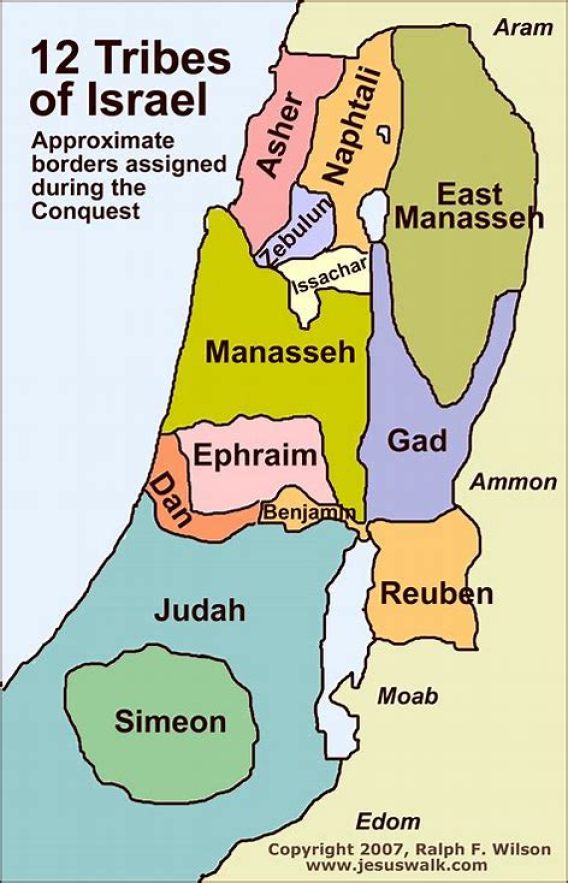Much of what is being reported about the war in Israel is disconnected from facts and reality.
This from wndnewscenter.org.

Twelve Tribes of Israel, c. 1200 BCE (according to the Book of Joshua)
The outlets communicating information to us seem no longer to have the responsibility of fact checking – and when they tell us they are fact checking, what they are doing is performing simple censorship. To interpret some of the things we are hearing about Israel and the Middle East, we mus understand some basic history. Being informed will help us categorize the information we are hearing—as fantasy or fact.
The following is a very abbreviated list of historical facts and information about the land upon which Israel rests today—the land that is at the point of this current conflict:
- Palestine was not an Arab nation in 1948, when the nation of Israel was recognized by the United Nations. So, formally and technically, the Jewish people did not [assume control of] someone else’s territory.
- Great Britain [was tasked with administering] mandated authority over the Middle East until they [turned] the volatile area [over to] the United Nations (U.N.) to help resolve the problem. Before Great Britain [assumed control] after World War I, the Turks had controlled the area since the 1500s. (Just for the record, the Turks are not Arabs.)
- Palestine has never been the name of any country. The name “Palestine” came from the Romans. After the Jews rebelled (again) in A.D. 130, the Romans wanted to rid the region of any semblance of Jewishness. So, they moved the Jews out, populated the area with former soldiers, and renamed it.
- [The Romans separated] Jerusalem [and] renamed the city and the region. The name that was chosen was ‘Philistia,’ which eventually turned into ‘Palestine.’ The name came from the ancient Philistines—Goliath, in the story of David and Goliath, was a Philistine. The Philistines were a biblical people back in the Old Testament, but they were eliminated and removed when the Babylonians marched on that part of the world in the seventh century B.C. The present-day Arab world has no connection to those biblical people.
- ‘Palestine’ was a geographic region. It was never a nation. There was never a president of the state, or a Palestinian governor, or a Palestinian government. It’s similar to how the Midwest is a region of our nation. We understand it to be a region of territory, but it’s not governed by some central administration. It’s simply a way of designating an area.
- In addition, the region of Palestine did not have any connection to Arab ethnicity. Muhammad was not born until the seventh century A.D., but the Romans labeled the area “Palestine” in the second century A.D.
- The U.N. Partition vote, which took place in November of 1947, extended the opportunity for two nations to be recognized. They proposed an Arab nation on the west side of the Jordan River, but the Arab world rejected the partition. The other part of the plan was for a Jewish nation. Israel accepted the offer, and in May of 1948, the modern state of Israel was born.
- The day after the nation of Israel was born and recognized, five Arab nations declared war on the new Jewish state. Over the radio stations (the primary media outlet at the time), those nations told the local population to take a vacation while they drove the Jews into the sea. To the world’s great surprise, those five Arab nations and their standing armies, in their united front, lost that war.
- The people on the West Bank of the Jordan River could have had peace. But they chose war, in an attempt to drive the Jews into the sea. That language is similar to what we’re hearing today.
- In 1948, when the ceasefire was declared, Israel had defended the territory they had been granted. Jordan controlled the territory on the West Bank of the Jordan River, and Egypt controlled Gaza. The Arabs in the West Bank became part of Jordan, and the Arabs in Gaza became part of Egypt.
- When the Palestinian Liberation Organization (PLO) was created, Jordan controlled the West Bank, and the ‘Palestine’ they wanted to liberate was Israel. Israel was occupying the land [Israel] had been granted by the U.N. As a part of that original plan, if the PLO really wanted to liberate the land [they] had been granted by the U.N., they should have been fighting Jordan and Egypt.
- Before Israel was birthed in 1948, everyone living in the region was considered Palestinian, whether they were Arab or Jew. The Jewish-owned newspaper was called The Palestinian Post.
- [For] a little broader view of history, Jerusalem has been the capital of only one country: Israel. King David established Jerusalem as the capital of Israel in 1000 B.C. If you do the math, that was more than 1,500 years before Muhammad was born.
Today, we hear that Israel was a country recognized by the U.N. but that this country does not have an historic right to the land (or something along those lines). But most of the countries of the Middle East are relatively new:
- Jordan was created in 1922 by Great Britain. They took 80% of the ancient region known as Palestine, and they created Transjordan on the eastern side of the Jordan River. It achieved independence in 1946.
- The Syrians were under French control until 1946.
- Lebanon received independence from France in 1943.
- Iraq became an independent nation in 1958.
These were nations created from the Ottoman Empire after World War I, when the Turks were defeated. They had not existed prior to the San Remo conference, which took place in 1920.
For a different perspective, the land mass of the Arab states (not including the non-Arab states of Turkey and Iran) occupies about 98.4% of the land in the region. Israel occupies about 1.6%. These are the facts, but the talking point we hear is, “There can be no peace until Israel gives up some territory.”
Another interesting fact is the words ‘Jerusalem’ [and] ‘Zion’ appear nearly a thousand times in the Hebrew Bible and the New Testament. [They] never appear in the Quran.
Understanding this quick history of the land upon which Israel rests today will help us discern fantasy from fact.
The United Nations did not establish Israel. In the book of Genesis, God promised a piece of territory—a piece of terra firma that you can find with Google maps—to the descendants of Abraham, Isaac, and Jacob forever.
God is unchanging and all-powerful, and as we move forward, we will see His purposes accomplished for Israel and His people.




